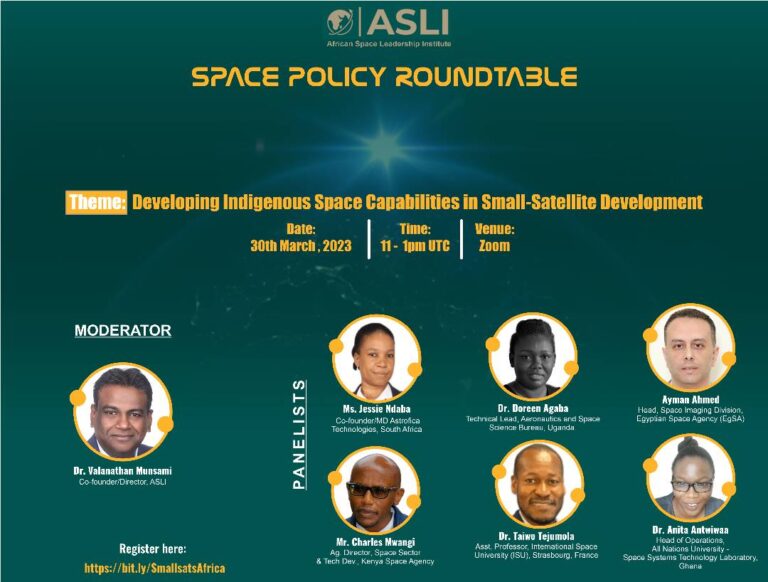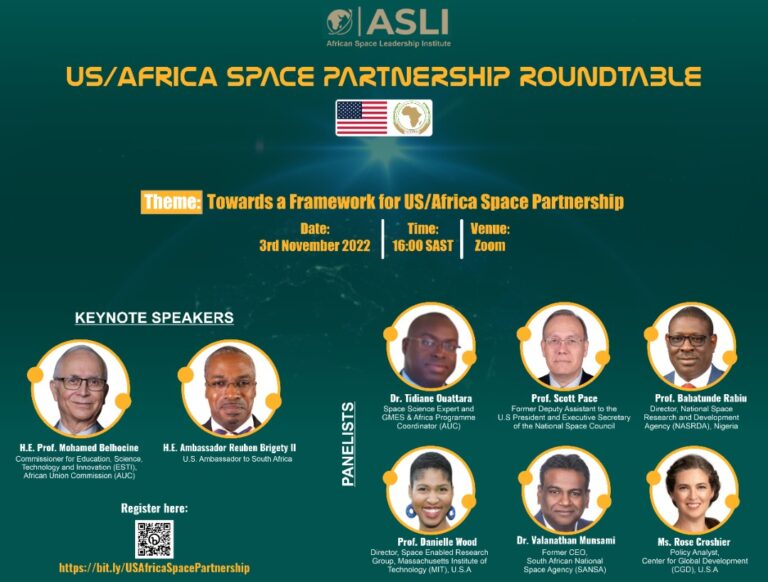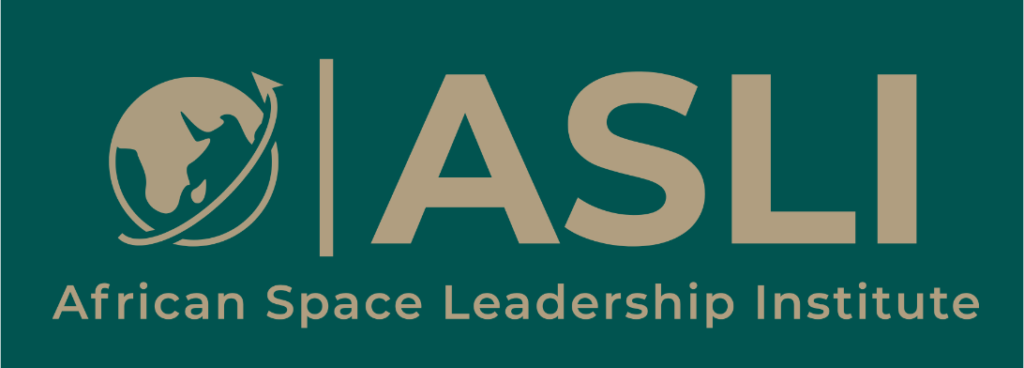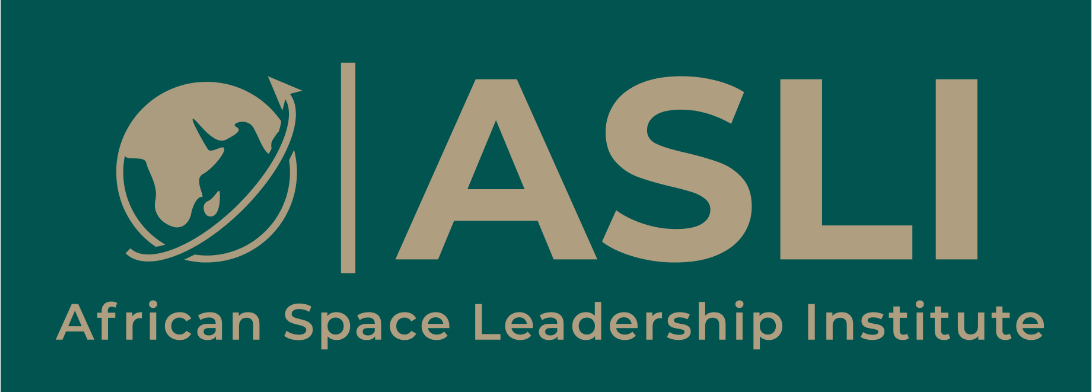ASLI Space Policy Roundtables are strategic and high level discussions featuring senior leaders ranging from government and academia to captains of industry. We are committed to fostering citizen led people-to-people space diplomacy and dialogues for regional, continental and international cooperation on space affairs.
ASLI aims at being a pan-African platform for strategic dialogue, people-to-people cooperation and steering African leadership in space affairs. Join our Space Policy Roundtables – high level engagements between civil society, academia, regional multilaterals and the private sector.

There is increasing interests in African countries to participate in space activities by procuring and operating small satellites. Some countries have leveraged on the postgraduate academic pursuits of young nationals in space systems engineering and converted their research projects into national satellite projects. Some countries contracted foreign companies to develop satellites for them with a proviso for know-how and technology transfer (KHTT). A few others have chosen the path of home-grown satellite development. Given all these efforts of either procuring or building, what is the current state of knowledge and skills in designing and building satellites in Africa? How can local capabilities and capacity be broadened and scaled up? We explore these issues in the forthcoming roundtable.
Guest Bio
The stellar panel includes Dr. Doreen Agaba, Dr. Ayman Ahmed, Mr. Charles Mwangi, Dr. Taiwo Tejumola and Dr. Anita Antwiwaa. It will be moderated by Dr. Valanathan Munsami.
Ms. Jessie Ndaba is a qualified electrical satellite engineer and Chief Commercial Officer at Astrofica Technologies (Pty) Ltd, a multi award winning Space Technology company she co-founded in 2017 together with her business partner Khalid Manjoo. She joined the Space industry in 2006. She was part of the AIT team that prepared SumbandilaSat for launch in 2009. She received a Young Space Leadership Award in 2010, then joined the International Space University (ISU), Strasbourg, France, in 2011 to further her studies in Space Systems Technology. She is a co-founder of the African Space Leadership Congress Youth Forum (ALC-YF). She was part of the Technical team that developed the Aerospace and Defense Masterplan which was a South African Presidential Initiative, after the successful completion of the Space Industry Development Policy Framework for the South African Department of Trade and Industry and Competition. She joined the National Earth Observation and Space Secretariat (NEOSS) as a co-chair for the SatComms and Navigation Community of Practice. She also received an Award by Charlotte Mannya- Maxege Foundation for Women Leadership in STEM. She was also invited to serve under the SANSA Board by the Minister of Science and Innovation. She continues to mentor young South Africans in the Space industry on South African sponsored programmes.
Dr. Doreen Agaba is an Electrical Engineer and a University of Cape Town-Radar Remote Sensing Group alumni. Her areas of specialisation are; Space Science and Astrophysics. She has done research in; Radar and Remote Sensing, Space Debris, CubeSat missions and Ionospheric Physics. She advocates for innovation in Space Science for socio-economic advancement. She is currently heading the Aeronautics and Space Science Bureau, under the Science Technology and Innovation Secretariat, Office of the President, Republic of Uganda.
Dr. Ayman Ahmed is the Head of the Space Imaging division at the Egyptian Space Agency- EgSA, He is a member of EgSA board of directors and member of Egyptian National Space Council, a Member of the African space Working Group to Develop African Space Policy and Strategy, a Member of the Industrial Advisory Board, Coventry University. Ayman has a Master’s degree in Business Administration and Ph.D. in satellite earth observation systems. He coordinated a number of space projects at national and international levels, received the united nation office of outer space affairs– UNOOSA prize 2021, and has a patent in improving the performance of electronic systems in the space environment.
Charles Mwangi is the Ag. Director, Space Sector & Technology Development at the Kenya Space Agency. He is overseeing Earth Observation (EO), Research, Education and Outreach programs as well as the Research Grant program at the Kenya Space Agency (KSA). Mr. Mwangi was part of the team that participated in the development of Kenya’s first space object, 1st Kenyan University NanoSatellite – Precursor Flight (1KUNS-PF), which was launched from the International Space Station. He holds a Master’s degree in Electrical Engineering (Control Engineering) from Jomo Kenyatta University of Agriculture, an International Master degree on Space Mission Design and Management from Sapienza University of Rome, Italy. He has also undertaken a Postgraduate course in GIS and Remote Sensing from ITC, University of Twente in Netherlands amongst other diverse training on project management, satellite engineering and remote sensing.
Dr. Taiwo Tejumola is an Assistant Professor of space systems engineering at the International Space University (ISU), Strasbourg, France. In this role he teaches and researches on innovative and need tailored applications on Earth using space systems with associated terrestrial infrastructures. He is also the discipline lead for the Space Systems Engineering discipline of ISU’s Interdisciplinary MSc in Space Studies program. Prior to joining ISU he was a research Associate at the Kyushu Institute of Technology, Japan where he worked on the design, development and operation of small satellites. He has held other research and academic roles in the area of space systems engineering at the National Space Research and Development Agency, and the Federal University of Technology, Akure both in Nigeria. Taiwo has a BEng degree in Electrical & Electronics Engineering from Ahmadu Bello University, Zaria, Nigeria, and a MSc and PhD in Space Systems engineering, both from the Kyushu Institute of Technology, Japan. His research and professional interests include small satellites payload development, plasma science, space systems engineering, project management and vigorously pursuing diversity and inclusion in the space industry for the underrepresented. Taiwo has authored numerous publications in international peer reviewed journals.
Dr. Anita Antwiwaa is the Head of Operations for All Nations University Space Systems Technology Laboratory (SSTL) who successfully launched the historic GhanaSat-1 in 2017 to take photographs of the Earth and to monitor Ghana’s coastal areas. She is a member of the ANU-SSTL outreach team which is working in the various Primary and Secondary Schools in Ghana to promote STEMI Education using Space Technology. Dr. Antwiwaa is also the Head of Department for Electronics and Communications Engineering- All Nations University, Ghana. She holds a PhD in Electronics and Communications Engineering from Sam Higginbottom University of Agriculture Technology and Science, India and a Master of Technology in Communication Systems Engineering from SRM University, India. She serves at the GEO programme Board as one of the representatives for Ghana. She is a member of the Institute of Engineering and Technology (IET). She is also an AU/CIEFFA STEM Ambassador. She was a participant for the first African Union Innovation Education in Africa Expo 2018 in Senegal and the Youth Capacity Building workshop on Entrepreneurship, Coding and STEM 2018 in Tunisia where she was named among the top 40 innovators in education in Africa. She has been a UNOOSA space4women network mentors from 2020-2022.
Dr Valanathan (Val) Munsami holds a PhD in Physics, a Masters of Business Leadership, a Space Studies Program Diploma, and a Certificate in International Air, Space and Telecommunications Law. He worked in South Africa’s Secretariat for the non-proliferation of weapons of mass destruction, managed the implementation of a suite of bilateral and multilateral science and technology agreements, involved in the development of South Africa’s National Space Strategy and National Space Policy, and oversaw the establishment of the South African National Space Agency (SANSA). On winning the bid in 2012 to co-host the Square Kilometer Array (SKA), the biggest radio astronomy project in the world, he became the Chief Specialist for Astronomy and African Space Science. In this role, he led the development of South Africa’s Multi-Wavelength Astronomy Strategy and the SKA Readiness Strategy for Africa, and conceptualized the model for the Pan African Space Science University of the African Union. He also chaired the African Union Space Working Group, which was tasked with the development of the African Space Policy and the African Space Strategy that was approved by the African Union Heads of State in January 2016, and also facilitated the Implementation Plan for the African Union Science, Technology and Innovation Strategy for Africa (STISA). He was the Chief Executive Officer (CEO) of SANSA for five years, ending in February 2022. He was also a member of the South African Council for Space Affairs (SACSA) and Vice President of the International Astronautic Federation. He is inducted as an academician of the International Academy of Astronautics (IAA) and sits on the Advisory Boards of the Space Generation Advisory Council (SGAC) and ZASpace Inc. (the Space Industry Forum of South Africa). He is currently the Chancellor of the International Space University, based in Strasbourg, France, a co-Founder of the African Space Leadership Institute, and most recently appointed as an Advisor to the Saudi Space Commission.
Play Event

On 20th July 2022, President Joe Biden of the United States of America (U.S.A) announced that the U.S.-Africa Leaders Summit would hold from 13-15 December 2022. In view of the planned Summit, the African Space Leadership Institute (ASLI) is organising a high-level Space Policy Roundtable, with the theme: “Towards a Framework for U.S.-Africa Space Partnership.”
The objectives of the roundtable include:
(1) Identify possible areas of collaboration (policy, programmes and projects) between the U.S. and Africa;
(2) Initiate a mechanism for periodic dialogue between Africa and the U.S. on space-related issues of mutual interests;
(3) Gather thoughts on a framework for U.S.-Africa Space Partnership.
Play Event
Space Policy Roundtables
Schedule
| Mon | Tue | Wed | Thu | Fri | Sat | Sun |
|---|---|---|---|---|---|---|
|
1
|
2
|
3
|
4
|
5
|
6
|
|
|
7
|
8
|
9
|
10
|
11
|
12
|
13
|
|
14
|
15
|
16
|
17
|
18
|
19
|
20
|
|
21
|
22
|
23
|
24
|
25
|
26
|
27
|
|
28
|
29
|
30
|
31
|

